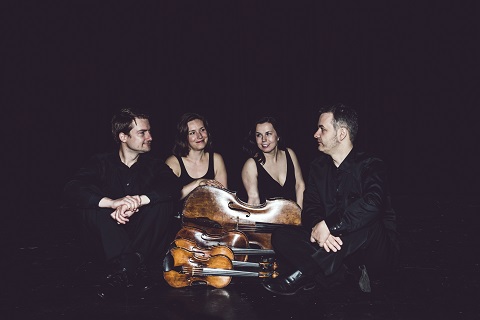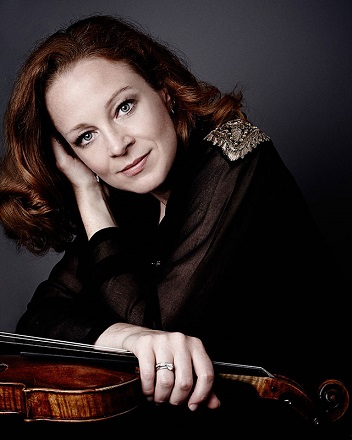16 Sep 2019
Immortal Beloved: Beethoven Festival at Wigmore Hall
So long as men can breathe or eyes can see,
So long lives this, and this gives life to thee.

So long as men can breathe or eyes can see,
So long lives this, and this gives life to thee.
In his eighteenth sonnet, Shakespeare celebrates the power of his poetry which, through its own immortality, ensures the posthumous survival of its muse. This concert at Wigmore Hall - the culmination of the Hall’s weekend Beethoven Festival - explored the figure of the ‘immortal beloved’ as it lives on in the work of Beethoven, Mahler, Janáček and Berg.
Immortalising the beloved is indeed one of art’s supreme powers, though it is often the artist’s own emotions that are foregrounded, the loved one - distant or departed - remaining ineffable, tinged with an air of unreality. And, just as Shakespeare’s ‘Fair Youth’ and ‘Dark Lady’ have remained elusive to scholars, so the identity of Beethoven’s ‘Unsterbliche Geliebte’ continues to generate historiographical debate and dispute. Antonie Brentano, Josephine Brunsvik, Almeria Esterhazy, Bettina Brentano: which was the woman to whom Beethoven expressed his apparently unrequited devotion? Or, was that mysterious beloved someone else altogether?
Just as unanswerable is the question, ‘Did the circumstances of Beethoven’s life affect his music, and if so, in what ways?’ Yet, it is this relationship between biography and music that we are invited to consider when we listen to the composer’s 1816 An die ferne Geliebte (To My Distant Love) which sets six poems by Alois Jeitteles, weaving them into a continuous musical narrative - the first ‘song-cycle’ of this kind. And, it was this relationship between art and life which broadcaster and Beethoven biographer John Suchet emphasised in his engaging introduction to the evening’s performances.
Baritone Benjamin Appl immersed himself in Jeitteles’ poems, which present suffering and yearning through natural imagery - the mountains and valleys that separate the poet-speaker from his loved one; the winds, clouds and brooks he envies as they wend their way towards the object of his desire; the nest-making swallows whose peaceful togetherness he covets. As well as effectively drawing out Beethoven’s gentle word-painting, Appl and pianist Kristian Bezuidenhout effectively built the continuous thirteen minutes of music towards the Romantic heights of the final song.
There was nothing melodramatic about Appl’s performance, though; he communicated directly, without undue mannerism, his sweet, walnut baritone infused with a lovely smooth grain. This was an unwaveringly elegant performance, and occasionally I wished for a little more rhythmic ‘drama’. For example, a slight rubato in the penultimate verse of the first song was finely judged, emphasising the poet-speaker’s distress (“Singen will ich, Lieder singen,/ Die dir klagen meine Pein!”), but the subsequent accelerando that Beethoven indicates was rather mild: surely Beethoven, in urgently pushing the music towards Allegro not only evokes but embodies a brief blooming of rapture, as the protagonist sings of song’s own transfiguring powers which “put to flight all space and all time”?
Appl crafted a lovely floating line at the start of ‘Wo die Berge so blau’ (Where the blue mountains), though occasionally the intonation did not feel entirely settled, and the duo negotiated the song’s temporal twists and turns fluently, finding passionate warmth in the closing crescendo . Bezuidenhout’s linking episodes shaped the unfolding moods convincingly. The circling arpeggios at the start of ‘Leichte Segler in den Höhen’, for example, captured the movement of the clouds sailing high above, their lightness suggested too by Appl’s graceful staccatos. ‘Diese Wolken in den Höhen’ (These clouds on high) was bright and buoyant, with deft piano ornaments and a vocal line with a firm rhythmic spring in its step.
Towards the close of ‘Es kehret der Maien’ (May returns), the poet-speaker’s optimism wanes, however, and Appl made effective use of a gentle head voice with the return of the text of the opening, pensively slowing into the final song, ‘Nimm sie hin den, diese Lieder’ (Accept, then, these songs’). Music’s power to transcend time and space is not, after all, eternal. Appl shaped the resigned ending beautifully, diminishing - like the red rays of the evening light which fade behind the mountains - to a wistful pianissimo, and leaving the protagonist’s yearning hanging in the air: “Nur der Sehnsucht sich bewüsst” (… aware only of longing).
 © Škampa Quartet.
© Škampa Quartet.
If the object of Beethoven’s affection remains elusive, then there is no doubting the inspiration of the passion expressed in Janáček’s Second String Quartet, which was given an astonishingly intense, even visceral, presentation by the Škampa Quartet. This was playing of striking vivacity and immediacy: an ‘operatic’ performance which made the elderly composer’s soul-consuming love for Kamila Stösslová powerfully tangible. The cello’s opening trill virtually throbbed and was complemented by the upper strings’ rich, warm tone, establishing the ardency that impelled the music ever onwards. I was struck by the way each voice in the texture had a clearly defined character and strong individual presence, but without any sense of ‘competition’ between the four voices which blended expertly in articulating the Romantic drama.
I don’t think I’ve ever heard the viola theme at the start of the second movement sing so tenderly as it did in Martin Stupka’s rendition or the high first violin line here and in the following movement sail with such a powerful combination of strength and sweetness as did Helena Jiříkovská’s. While the tutti sound was gloriously full it was never overly forceful and there was a lovely transparency to the textures allowing us to appreciate each singing voice. The pulse of the final movement was compelling - a heart beating with strong surges of love - and the Škampa did not push the tempo of this movement too much, allowing space for the contrasts to register and for the trills and decorations to be carefully defined. At the end, there was an overwhelming feeling of hope - an optimism that was absolutely uplifting. A truly wonderful performance.
 Carolin Widmann.
Carolin Widmann.
Carolin Widmann’s performance of Berg’s Violin Concerto, which is dedicated to the memory of Manon Gropius, the daughter of Alma Mahler Werfel and Werther Gropius, was no less absorbing. Widmann’s immensely powerful and focused sound conveyed every ounce of the work’s Romantic lyricism, all the while articulating the structure with assured insight and clarity. Standing at the centre of the O/Modernt Chamber Orchestra, directly facing the audience, Widmann communicated with astonishing poise and probing musicality. Immersed in the musical explorations, at the close of the cadenza she turned almost fiercely towards ensemble leader/director Hugo Ticciati, as if to dare him to join her unfolding arguments. There was gentleness too, though, most especially in the closing Adagio which faded mesmerisingly into silent stillness, preparing us for the final item of the programme, the Adagietto from Mahler’s Fifth Symphony which, led by violinist Priya Mitchell, brought peace and closure to the evening’s Romantic yearnings.
Claire Seymour
Beethoven Festival: Beethoven - An die ferne Geliebte Op.98, Janáček - String Quartet No.2, ‘Intimate Letters’, Berg -Violin Concerto, Mahler - Symphony No.5, Adagietto
Benjamin Appl (baritone), Kristian Bezuidenhout (piano), Škampa Quartet, Carolin Widmann (violin), O/Modernt Chamber Orchestra (director/violin, Hugo Ticciati).
Wigmore Hall, London; Saturday 14th September 2019.